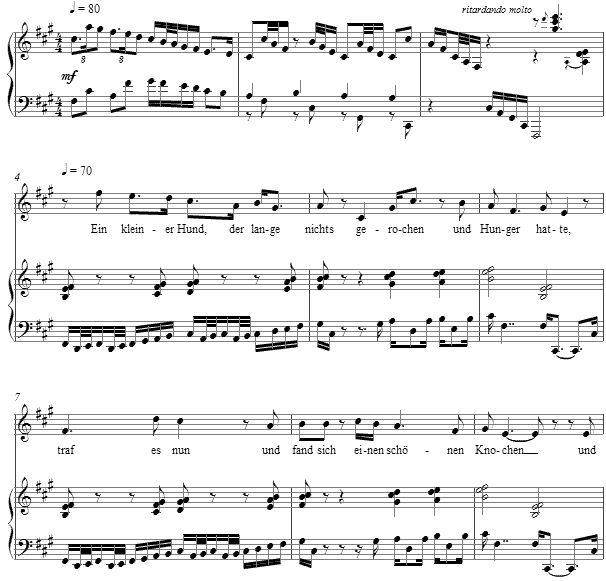Music and Texts of GARY BACHLUND
Vocal Music | Piano | Organ | Chamber Music | Orchestral | Articles and Commentary | Poems and Stories | Miscellany | FAQs
Der grosse und der kleine Hund - (2001)
Matthias Claudius
for soprano and piano
Ondrej Prokopec gewidmet
Ein kleiner Hund, der lange nichts gerochen
Und Hunger hatte, traf es nun
Und fand sich einen schönen Knochen
Und nagte herzlich dran, wie Hunde denn wohl tun.
Ein großer nahm sein wahr von fern:
»Der muß da was zum Besten haben,
Ich fresse auch dergleichen gern;
Will doch des Wegs einmal hintraben.«
Alard, der ihn des Weges kommen sah,
Fand es nicht ratsam, daß er weilte;
Und lief betrübt davon, und heulte,
Und seinen Knochen ließ er da.
Und Packan kam in vollem Lauf
Und fraß den ganzen Knochen auf.Ende der Fabel
»Und die Moral?« Wer hat davon gesprochen? -
Gar keine! Leser, bist du toll?
Denn welcher arme Mann nagt wohl an einem Knochen,
Und welcher reiche nähm' ihn wohl?DER GROSSE UND DER KLEINE HUND, oder Packan und Alard
[ 5 pages, circa 2' 50" ]
Matthias Claudius
Matthias Claudius was born 15 August 1740 in Holstein, a minister's son. He studied theology and law, during 1764-1765 was secretary of the Count in Holstein, then from 1768 to 1770 worked for two newspapers in Hamburg. A well-known writer and minor poet, Claudius died 21 January 1815 in Hamburg.
This commentary in poetic form speaks volumes about that time and this, as the powerful and wealthy often preach and proclaim to others of their concerns for the needy, all the while profiting wildly from them. Such is the nature of modern social welfare governments and their bureaucracies, akin to the old aristocracies and their petty bourgeoisie or the tsars and their commissars or the mandarins and their governors, wherein an elite aggrandizes for itself from the many for their few, all the while saying they pursue the opposite course, all as a means to their self-preservation.
One notes that Claudius accurately observes the "rich" happily deprive others of their "bones." So was it, and so is it today. Le plus change, le plus même chose."
The Big and Little Dogs
A little dog, that hadn't recently sniffed a bone but was hungry, came across a beautiful bone and happily gnawed on it, as dogs tend to do.
A bigger dog came from afar: »As one who wishes to have the best,
I'll happily gnaw on that same bone; so I'll drive him away.«
Alard, who saw the other come along the path, found it unwise to tarry;
and he ran sadly away howling, for he had to leave his bone there.
And Packan came in full stride and swallowed up the entire bone.
End of the Fable
»And the moral?« Who has spoken of this?
No one really! Reader, are you amazed?
What poor man gnaws happily on a bone,
and what rich man deprives him of it happily?
The setting is in three parts, two strophes for the storytelling and a foreshortened third as coda for the moral of this tale. The running themes and the repetition of "nagte" and "fresse" as these dogs chew and consume the bone are meant in a humorous vein to be well enunciated and comically presented. The moral of the story is of course, serious, and should be delivered with increasing fervor.
The score is available as a free PDF download, though any major commercial performance or recording of the work is prohibited without prior arrangement with the composer. Click on the graphic below for this piano-vocal score.

